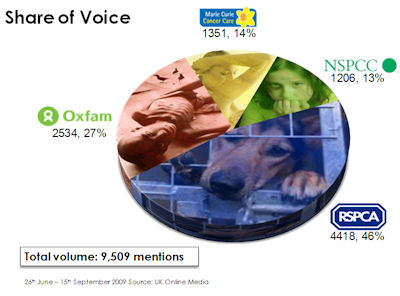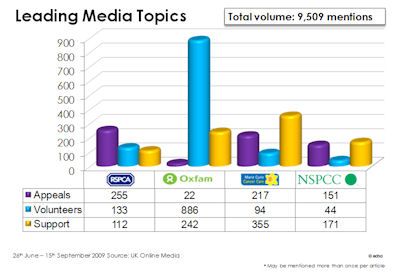This summer, animal charity RSPCA has dominated charity online coverage, according to latest research commissioned by PRmoment. The research analysed UK online stories about Oxfam, Marie Curie Cancer Care, NSPCC and RSPCA, and discovered that 46 per cent of these concerned the animal charity. Oxfam was the subject of nearly a third of stories, while Marie Curie and NSPCC generated a similar amount of coverage at 14 per cent and 13 per cent respectively.

Research supplied by Echo Sonar
Britain has a reputation for being a nation of animal lovers, and it seems the media is also more interested in animal charity work than any other good cause. Animals often feature in the news, and one summer animal story in which the RSPCA was regularly mentioned, concerned two police dogs who died trapped in a hot car at the end of June. For example, at Mail online on 3 July, a story says: “Animal lovers reacted with disbelief at the officer's apparent lack of common sense and seeming ignorance of the RSPCA's simple warning that 'a hot car can be a death trap for dogs’”.
It is not surprising to Henry Macaulay, head of press and media at RSPCA, that the media reflects our national interest in animals. He says: "The British public is fascinated by animals so there is always an audience keen to hear about the RSPCA's work whether it's helping farm animals, wildlife, pets or animals used in research.” Discussing how the charity works to get itself noticed in today’s online environment, Macaulay admits that evolving media does provide challenges, not least because of the demand to keep up with constant new developments, but adds, “it's an exciting new world which constantly throws up new opportunities to engage our supporters and hopefully recruit new ones as well."

Research supplied by Echo Sonar
Keith Bradbrook, deputy director of communications at NSPCC, agrees that the online arena has broadened the scope for creating interesting ways to communicate with audiences. He believes that new media has not made it easier, or harder, to publicise the charity, but has simply created a “different set of challenges”. He gives the example of how NSPCC is about to launch new online services for its Childline brand, and adds, “It is not about communicating better, it is about making us think differently about a service we offer.” Bradbrook is also enthusiastic about the fresh avenues that online media has allowed the charity to explore, such as social networks, which the charity has been working with for several years.
Topics of stories about each charity were noticeably different, and it is particularly noteworthy how most of Oxfam’s coverage concerned its volunteers. These stories often focus on current projects volunteers are working on, and any new project coming up. There are also a number of articles which describe celebrities becoming volunteers – for example, in the beginning of July, author Philip Pullman helped out in an Oxfam bookshop in Oxford. For the other three charities, appeals and support were the most common subjects.
The charities are succeeding in generating their own stories that interest the media, one example of this being a recent story reported on sky news.com earlier this month, which was based on the results of a survey carried out by the NSPCC showing that sexual abuse among British teenagers has reached alarming levels.
PRmoment asked Echo Sonar to compare all UK online media coverage of Oxfam, Marie Curie Cancer Care, NSPCC and RSPCA from 26 June to 15 September. Metrics included share of voice, volume of media topics and tonality.
![]()
PR Masterclass: The Intersection of PR and GEO
Wednesday 25th February, both virtual and in person tickets are available.
PR MasterclassIf you enjoyed this article, sign up for free to our twice weekly editorial alert.
We have six email alerts in total - covering ESG, internal comms, PR jobs and events. Enter your email address below to find out more:





